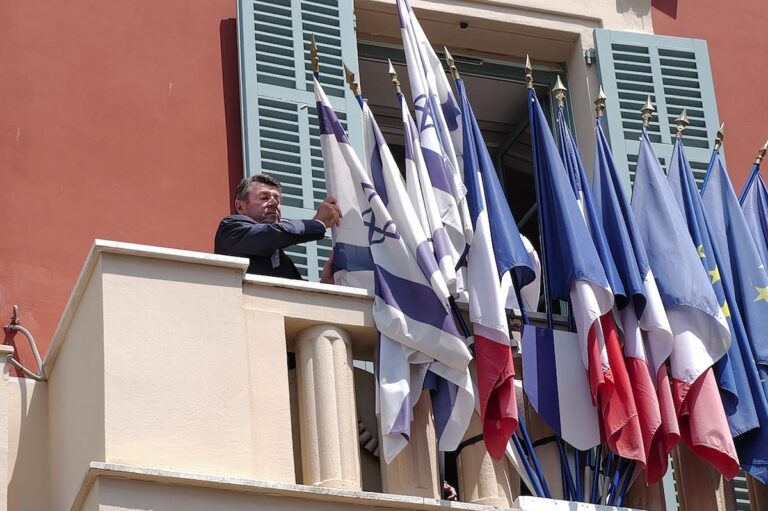In a controversial decision that has sparked intense debate, the mayor of Nice, France, has complied with a court order mandating the removal of Israeli flags from the town hall. The directive, which stems from legal challenges citing concerns over political neutrality in public spaces, has drawn both support and criticism within the community and beyond. As tensions rise in the Middle East and solidarity gestures proliferate across Europe, this incident highlights the complexities of local governance in a global context. The situation in Nice underscores the intersection of politics, identity, and public sentiment in a city historically significant for its diverse population and rich cultural heritage.
French Court Ruling Sparks Controversy Over Israeli Flags at Nice Town Hall
The recent decision by the mayor of Nice to remove Israeli flags from the town hall has ignited a firestorm of debate across France and beyond. This move follows a judicial ruling that deemed the display of the flags as politically contentious and inappropriate for a public building. Advocates for the removal argue that it embodies a commitment to neutrality and respect for all communities, while opponents contend that it represents a suppression of support for Israel amid ongoing geopolitical tensions. The debate reflects the broader societal rift regarding the Israeli-Palestinian conflict and the symbolism linked to national flags in public spaces.
Responses to the ruling have been mixed, illustrating the deeply entrenched perspectives on this issue:
- Supporters of the removal claim it fosters inclusivity and upholds secularism in French public life.
- Critics argue that it undermines France’s strong historical ties with Israel and limits the expression of solidarity.
- Local community reactions have varied, with some calling for a larger dialogue on international solidarity.
In light of this controversy, the city government is reportedly considering alternative ways to express support for various international causes, possibly involving broader community consultations to reflect the diverse views within Nice.
Mayor’s Decision and the Political Implications for Local Governance
The recent court order mandating the removal of Israeli flags from the town hall of Nice has stirred significant political debate, showcasing the delicate balance between local governance and international relations. This decision underscores the mayor’s position as a representative figure, navigating complex societal sentiments and international affairs. Critics argue that such moves may politicize local governance, fostering divisions within the community and detracting from pressing domestic issues, such as public services and local economic development. The implications extend beyond mere symbolism, raising questions about the extent to which local leaders should engage in broader geopolitical matters.
Furthermore, this incident has catalyzed a conversation about municipal autonomy in a global context. Mayors across France and beyond are now watching closely, as the outcome of this situation may set legal precedents affecting how local governments engage with international symbols and whether they can effectively balance community identity with foreign relations. Various stakeholders are now calling for clarity on how local governments should act in instances where regional sentiments clash with overriding national or international mandates. As public discourse shifts towards this legal and ethical landscape, it becomes essential for local authorities to establish a framework that promotes unity rather than division.
Community Reactions: Divided Opinions on Symbolism and National Identity
The recent decision by the mayor of Nice to remove Israeli flags from the town hall, following a court directive, has sparked a wave of divided opinions among residents and observers. Supporters of the mayor argue that the removal is a crucial stance on maintaining neutrality, emphasizing that national identity should not be intertwined with foreign conflicts. Many cite the need for a politically neutral space, advocating for unity among diverse community members. Key voices in this camp stress that such actions bolster France’s secular principles and facilitate a harmonious coexistence among different cultural identities.
In stark contrast, critics express outrage over the mayor’s decision, viewing it as a disregard for the city‚Äôs historical ties and moral obligations. They believe that the flags represented solidarity with Israel, particularly amidst current geopolitical tensions. Community activists highlight concerns over the implications this removal has on friendships with Jewish citizens, citing that the symbolism of the flags is integral to cultural representation and support. This perspective raises significant questions regarding the role of local governments in navigating complex international issues and their impact on city dynamics.
| Supporters | Critics |
|---|---|
| Advocate for neutrality | Focus on solidarity |
| Emphasize secularism | Concern for Jewish community |
| Promote diversity | Highlight historical ties |
Legal Precedents: Understanding the Intersection of Local Law and International Symbols
The recent decision by the mayor of Nice to remove Israeli flags from the town hall has stirred a significant legal debate, reflecting the complex relationship between local regulations and international symbolisms. The court’s order was rooted in interpretations of municipal decorum and the neutrality of public spaces, echoing previous case law that underscores the importance of maintaining a balanced representation of diverse communities. Legal experts suggest that this case could set a precedent for similar disputes in the future, raising questions about what symbols are deemed appropriate in public institutions.
This incident highlights the necessity for municipalities to navigate between national sentiments and international relations, often embodying the tensions of global politics at a local level. Key factors influencing this ruling include:
- Public Sentiment: Local opinions on international conflicts.
- Legal Framework: Statutes governing the display of foreign flags.
- Cultural Representation: Efforts to ensure equal representation of various communities.
| Aspect | Impact |
|---|---|
| Local Law | Enforces neutrality in public representation. |
| International Symbols | Potentially polarizing within diverse populations. |
The Conclusion
In conclusion, the decision by the mayor of Nice to remove Israeli flags from the town hall, following a court ruling, has ignited a complex debate surrounding political expression and local governance in France. This action reflects the broader tensions regarding international relations and local identity, particularly in the context of the ongoing Israeli-Palestinian conflict. As Nice navigates this contentious issue, it remains to be seen how community responses will evolve and whether this incident will influence similar actions in other municipalities across the country. Stakeholders are urged to consider the implications of such decisions on social cohesion and diplomacy as they unfold in the weeks ahead.




